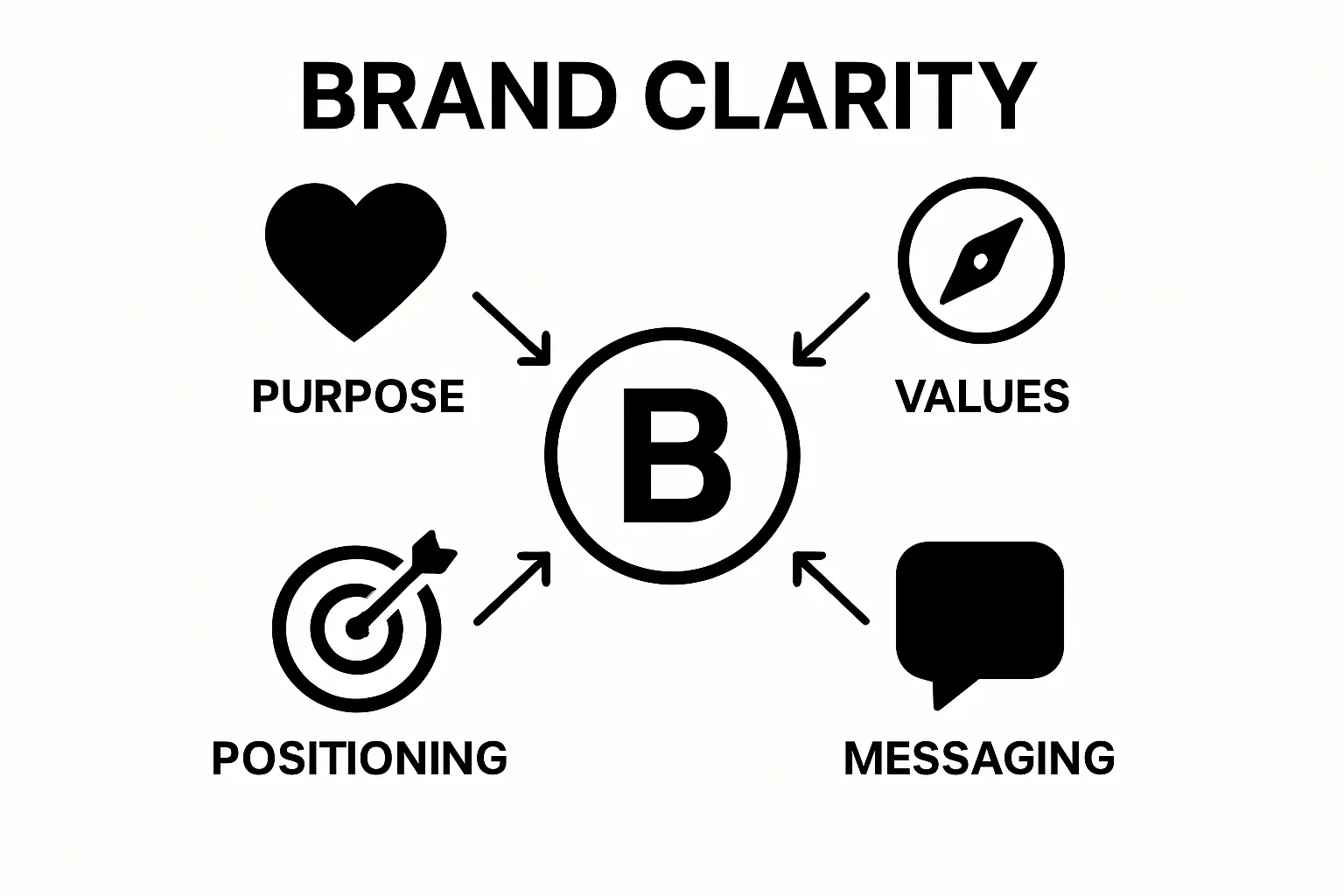What Is Rebranding and Why It Matters

Discover what is brand clarity and why it is crucial for business success. Understand its impact, components, and how it can streamline your efforts.

Every business wants to stand out and feel memorable. Yet nearly 70 percent of small businesses admit their branding is confusing both for employees and customers. You might think a flashy logo or clever slogan is the answer, but real transformation starts much deeper. The secret is brand clarity and it does far more than make you look polished.
Brand clarity represents the precise articulation of a business’s fundamental identity and value proposition. At its core, it transforms an abstract concept into a crystal clear communication framework that resonates with both internal teams and external audiences. Unlike generic branding efforts that create surface level messaging, brand clarity digs deep into the authentic essence of what makes a business unique.
Understanding brand clarity requires breaking down its fundamental elements. Brand clarity is not just about having a logo or a catchy tagline—it’s a comprehensive understanding of who you are as a business, what you stand for, and how you differentiate yourself from competitors.
Below is a breakdown of the core components of brand clarity, providing clear definitions and explanations for each element discussed in the article.
| Component | Definition | Explanation |
|---|---|---|
| Purpose | The fundamental reason your business exists beyond making money | Reflects the deeper motivation and impact your business seeks to create |
| Values | The core principles guiding your business decisions and interactions | Demonstrates the ethical stance and commitments shaping your company culture |
| Positioning | How you uniquely solve problems for your target audience | Highlights your place in the market and what sets you apart from competitors |
| Messaging | The consistent language and narrative communicating your brand’s identity | Ensures clarity and resonance in communication with both internal and external groups |
The key components include:

For early stage entrepreneurs and small business owners, brand clarity serves as a strategic compass. Without a clear understanding of your brand’s identity, marketing efforts become scattered and ineffective. Imagine trying to navigate a complex city without a map—that’s what running a business feels like without brand clarity.
Clarity transforms your business from a generic service provider to a distinctive, memorable brand. It helps potential clients instantly understand what you offer, why you’re different, and why they should choose you over alternatives. More importantly, it provides internal alignment, ensuring every team member understands and represents the brand consistently.
By developing brand clarity, entrepreneurs create a powerful framework that guides decision making, attracts ideal clients, and builds long term credibility in their market. It’s not just about looking professional—it’s about creating a compelling narrative that turns strangers into loyal supporters.
Brand clarity isn’t just a marketing buzzword—it’s the strategic foundation that separates successful businesses from those struggling to gain traction. For entrepreneurs and small business owners, understanding its profound importance can mean the difference between blending into the background and standing out in a crowded marketplace.
At its essence, brand clarity creates a powerful alignment between what a business promises and how it delivers that promise. When your brand communicates with precision and authenticity, you create a magnetic force that attracts your ideal customers and repels those who aren’t the right fit.
The strategic advantages of brand clarity include:
This table summarizes the strategic advantages of brand clarity for entrepreneurs and small business owners, highlighting the main benefits discussed and their impacts on business performance.
| Strategic Advantage | Description | Impact on Business Performance |
|---|---|---|
| Targeted Attraction | Draws the right customers who resonate with your unique value proposition | Increased lead quality and easier client conversion |
| Competitive Differentiation | Clearly shows why clients should choose you over alternatives | Strong market position and reduced price competition |
| Operational Focus | Provides a north star for business decisions and planning | More consistent growth and efficient resource allocation |
| Team Alignment | Ensures everyone understands and embodies the brand’s core mission | Consistent client experience and cohesive internal culture |
Brand clarity isn’t just an abstract concept—it directly impacts business performance. Businesses with clear, consistent branding experience higher customer recognition, increased trust, and more predictable marketing outcomes. Potential clients are more likely to invest in a brand that communicates its value with confidence and precision.
Moreover, brand clarity provides psychological comfort. Customers want to understand exactly what they’re buying and what transformation they can expect. A clear brand removes uncertainty, reducing purchase anxiety and increasing the likelihood of conversion.
The most successful entrepreneurs recognize that brand clarity is about creating a compelling narrative. It’s not just about selling a product or service—it’s about telling a story that connects emotionally with your target audience. When done right, brand clarity transforms your business from a mere transaction into a meaningful relationship that customers want to be part of.
Brand clarity emerges from carefully crafted and intentionally designed elements that work together to create a cohesive and powerful brand identity. These components are not isolated pieces but interconnected frameworks that communicate your business’s unique essence and value proposition.
At the core of brand clarity are two fundamental elements that provide strategic depth and authenticity. Purpose represents the deeper motivation behind your business—the transformative impact you want to create beyond financial gain. It answers the critical question: Why does your business exist?
Values complement purpose by establishing the principles that guide your business decisions and interactions. These are not generic statements but genuine commitments that demonstrate your brand’s character and ethical stance.
Key characteristics of strong purpose and values include:
Positioning defines how your brand uniquely solves problems for your target audience. It’s about carving out a distinctive space in the marketplace that sets you apart from competitors. Effective positioning goes beyond surface level features and taps into the deeper psychological needs and desires of your ideal clients.
Messaging is the strategic translation of your positioning into clear, compelling language. It involves crafting a narrative that speaks directly to your audience’s challenges, aspirations, and potential transformations. Powerful messaging doesn’t just describe what you do—it articulates the specific value and change you bring to your clients’ lives.
These elements combine to create a holistic brand identity that is both strategically precise and emotionally compelling. For entrepreneurs and small business owners, understanding and implementing these components means transforming their brand from a generic service into a memorable, impactful experience that attracts and retains ideal clients.
Brand clarity is not a static concept but a dynamic process of aligning your business’s deepest intentions with external communication strategies. It transforms abstract vision into tangible, actionable frameworks that guide every aspect of your organizational behavior and market interaction.
The mechanism of brand clarity begins with comprehensive internal alignment. This means ensuring that every team member understands not just what the business does, but why it exists and how their individual roles contribute to the larger mission. When internal perspectives are synchronized, external messaging becomes naturally consistent and authentic.
Key aspects of internal alignment include:
Brand clarity works by converting abstract vision into concrete strategic approaches. This translation process involves breaking down high level aspirations into specific, measurable objectives that can be implemented across different business functions.
The translation occurs through careful articulation of:
Effective brand clarity creates a symbiotic relationship between vision and execution. It transforms philosophical intentions into practical business strategies that can be consistently applied, measured, and refined. For entrepreneurs, this means developing a brand that is not just a logo or tagline, but a living, breathing organizational DNA that guides decision making at every level.
Ultimately, brand clarity is about creating a seamless connection between internal motivation and external perception. When done right, it turns your business from a mere service provider into a compelling narrative that attracts, engages, and retains your ideal audience.
Brand clarity transforms abstract concepts into tangible business success. By examining how different entrepreneurs and businesses have implemented clear brand strategies, we can understand the profound impact of purposeful communication and strategic positioning.
Entrepreneurs who master brand clarity often experience remarkable transformations in their business trajectory. Consider a local fitness coaching business that doesn’t just sell workout plans, but positions itself as a holistic lifestyle transformation platform. Their brand clarity means every touchpoint communicates a comprehensive approach to personal wellness—from social media content to client interactions.
Characteristics of successful brand clarity implementation include:
Service based businesses particularly benefit from crystal clear brand positioning. A graphic design studio, for instance, might distinguish itself not just by technical skills, but by emphasizing its commitment to helping entrepreneurs tell their unique stories visually. This clarity allows them to command premium pricing and attract clients who value narrative driven design.
Brand clarity works by:
The power of brand clarity lies in its ability to transform businesses from commodity providers to purpose driven partners.
 When entrepreneurs invest time in understanding and articulating their unique value proposition, they create a magnetic force that draws ideal clients and creates sustainable growth.
When entrepreneurs invest time in understanding and articulating their unique value proposition, they create a magnetic force that draws ideal clients and creates sustainable growth.
These real world examples demonstrate that brand clarity is not a theoretical concept, but a practical strategy that can be implemented by businesses of any size. The key is commitment to authentic, consistent communication that goes beyond surface level marketing to create meaningful connections.
If you feel overwhelmed trying to define your purpose, values, and positioning, you are not alone. The article highlights how a lack of brand clarity leads to scattered marketing and confusion for both your team and your audience. Imagine how much easier it would be to grow your business if every message felt authentic and every decision was grounded in a strong brand foundation. That’s exactly where Reasonate Studio comes in.

Let our experts guide you through The Aligned Impact Model™ to uncover your unique strengths, sharpen your message, and connect with your ideal clients. Whether you are turning a side business into a full-time venture or leveling up your existing brand, Reasonate Studio makes the complex simple. Visit our home page to see how sustainable, emotionally intelligent strategy can turn brand clarity into measurable growth. Take your first step today and start building a brand that truly resonates.
Brand clarity is the clear articulation of a business’s identity, purpose, values, and unique value proposition, which helps internal teams and external audiences understand what makes the brand distinct.
Brand clarity provides a strategic compass for entrepreneurs, helping to align marketing efforts, attract ideal clients, and build long-term credibility in their market.
The core components of brand clarity include purpose, values, positioning, and messaging, all of which work together to create a cohesive and compelling brand identity.
Businesses can achieve brand clarity by ensuring internal alignment on brand purpose and values, crafting effective positioning, and developing clear messaging that resonates with their target audience.